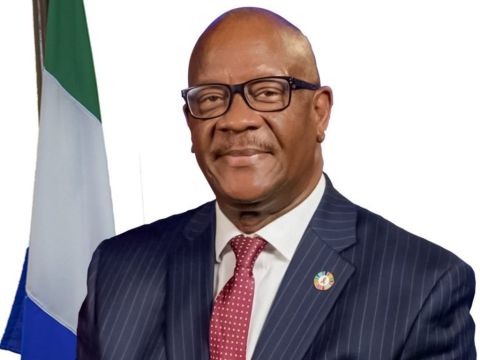By Nasratu Kargbo
President Julius Maada Bio has on behalf of the country expressed commitment to meeting the Immunization Agenda 2030.
He made this commitment on 19th February 2023, whilst speaking as Chairman for a session to Build Momentum for Routine Immunization Recovery in Africa on the fringes of the AU Assembly in Addis Ababa.
Bio said: “As part of our commitment to the Immunization Agenda 2030 and the African Regional Strategic Plan on Immunization, we have paid all the co-financing requirements for vaccine supplies including an advance payment for 2023 despite the economic challenges that my country faces”.
He explained that the country has hugely invested in vaccines and immunization, an indication that the country is fully committed to achieving the Immunization Agenda 2030 as well as the African Regional Strategic Plan on immunization.
The President said he believes that it is possible to achieve the national and global immunization targets, which includes eradication and elimination goals. He added that progress made in meeting immunization targets will facilitate equitable health outcomes for children, mothers, and the population as a whole.
Bio stated that in October 2022 the government introduced a two-week nationwide vaccination of the Human PapillomaVirus (HPV) vaccine as a way to eliminate cervical cancer amongst women and girls, explaining that girls aged ten were targeted.
“In Sierra Leone, 20% of under-five mortality is due to malaria. The new malaria vaccine, planned for introduction in 2024 will reduce hospitalization for severe malaria and all-cause mortality in under-5 children” said President Bio.
Highlighting the various vaccines rolled out, Bio said the country has committed $ 806,238 for 575,370 doses of routine vaccines such as DPT, PCV, MR, Rota, Yellow fever, HPV, adding that funds have been allocated for an amount of one million doses of the new malaria vaccine for this year.
Speaking on 18 February 2023 at the programme in Addis Ababa, President Bio said one thing learnt is that pandemic prevention, preparedness and response is everyone’s concern. He emphasized that keys for managing outbreaks include political leadership, health diplomacy, technical capabilities, active community engagement and flexible funding amongst others.
The president stated that despite the great improvement the country has made over the years, the Ebola outbreak of 2014 to 2016 in West Africa remains fresh in the minds of the people, adding that Sierra Leone had over 14,000 infections and nearly 4,000 deaths.
He noted that the lessons learnt during the outbreak were displayed before and during the response to COVID-19 pandemic.
“Even before the first case was detected in my country, I assembled a Presidential-Taskforce that I chaired. I took full responsibility and accountability for the response. The Taskforce included representation of key line-Ministries of my government and civil society. We also maintained strong links with international development partners and the private sector” said the President.
He explained that the experiences from the two outbreaks have taught the government and the country that epidemics and pandemics are not only health issues, but can negatively affect all spheres of life.
He added that due to the tremendous negative effects such outbreaks can cause to the masses, the government is establishing an effective and efficient approach to service delivery by strengthening Primary Health Care and improving clinical services at the secondary and tertiary levels, among others.
President Bio mentioned the enactment of the Public Health Bill and stated that there will be a new Public Health Agency which he said will build and strengthen core competencies in areas such as surveillance and epidemiology, data and data analytics, laboratory science, and research to answer local and global questions.
He added that whilst the above is ongoing, handling routine health challenges and honing early warning systems during ‘quiet’ periods will be done. “We will complement those efforts with simulations and exercises to maintain outbreak response competencies”, he said.
The country in 2014 was seriously hit by the Ebola epidemic which took away many lives and economically destabilized the country. In 2020 also, the country got the shock of the corona virus disease which affected many parts of the world but this time the pandemic caused relatively low casualties.
Copyright © 2023 Politico Online (27/02/23)








